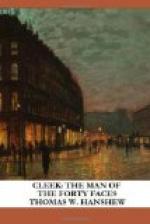“My late husband’s cousin; heir, after my little son, to the title and estates. He is very poor, deeply in debt, and the inheritance would put an end to all his difficulties. But he is fond of my son; they seem almost to worship each other. I, too, am fond of him. But, for all that, I have to remember that he and he alone would benefit by Cedric’s death, and—and—wicked as it seems—Oh, Mr. Cleek, help me! Direct me! Sometimes I doubt him. Sometimes I doubt everybody. Sometimes I think of those other days, that other mystery, that land which reeks of them; and then—and then—Oh, that horrible Ceylon! I wish I had never set foot in it in all my life!”
Her agitation and distress were so great as to make her utterances only half coherent; and Ailsa, realising that this sort of thing must only perplex Cleek, and leave him in the dark regarding the matter upon which they had come to consult him, gently interposed.
“Do try to calm yourself and to tell the story as briefly as possible, dear Lady Chepstow,” she advised. Then, taking the initiative, added quietly, “It begins, Mr. Cleek, at a period when his little lordship, whose governess I have the honour to be, was but two years old, and at Trincomalee, where his late father was stationed with his regiment four years ago. Somebody, for some absurd reason, had set afoot a ridiculous rumour that the English had received orders from the Throne to stamp out every religion but their own—in short, if the British were not exterminated, dreadful desecrations would occur, as they were determined—”
“To loot all the temples erected to Buddha, destroy the images, and make a bonfire of all the sacred relics,” finished Cleek himself. “I rarely forget history, Miss Lorne, especially when it is such recent history as that memorable Buddhist rising at Trincomalee. It began upon an utterly unfounded, ridiculous rumour; it terminated, if my memory serves me correctly, in something akin to the very thing it was supposed to avert. That is to say, during the outburst of fanaticism, that most sacred of all relics—the holy tooth of Buddha—disappeared mysteriously from the temple of Dambool, and in spite of the fact that many lacs of rupees were offered for its recovery, it has never, I believe, been found, or even traced, to this day, although a huge fortune awaits the restorer, and, with it, overpowering honours from the native princes. Those must have been trying times, Lady Chepstow, for the commandant’s wife, the mother of the commandant’s only child?”
“Horrible! horrible!” she answered, with a shudder, forgetting for an instant the dangers of the present in the recollection of the tragical past. “For a period, our lives were not safe; murder hid behind every bush, skulked in the shadow of every rock and tree, and we knew not at what minute the little garrison might be rushed under cover of the darkness and every soul slaughtered before the relief force could come to our assistance. I died a




